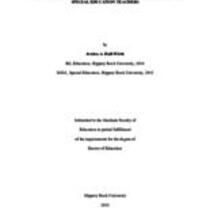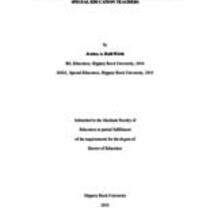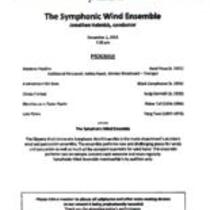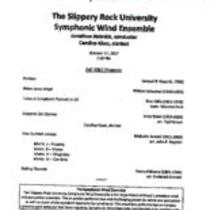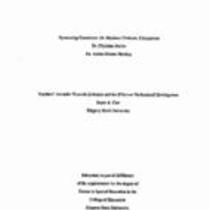- Title
- A survey approach to effects of work related stress among special education teachers
- Year Issued
- 2018
- Abstract
-
Teacher stress studies suggest that teacher stress has become progressively heightened. Researchers have acknowledged that teachers are stressed, and in turn, there has been an increase in burnout and turnover within the field. Seemingly, even with the magnitude of a...
Show moreTeacher stress studies suggest that teacher stress has become progressively heightened. Researchers have acknowledged that teachers are stressed, and in turn, there has been an increase in burnout and turnover within the field. Seemingly, even with the magnitude of attention dedicated to preventing occupational stress, the prevalence is growing. In response, this study aimed to understand special education teachers and the stressors within their occupation. This study used a questionnaire using a Likert scale and opened ended questions to gain a better understanding of the stressors and overall well-being of special education teachers. The mixed methods approach allowed for a comprehensive look at 45 K-12 special education teachers within four school districts in Western Pennsylvania. The data was collected from April to May of 2018 and used the themes: (a) working conditions, (b) professional responsibilities, (c) student needs, and (d) student behavior to categorize the data. Data suggested that the working conditions and professional responsibilities provided the most stressors for special education teachers. The questionnaire also provided insight on an individual’s inability to differentiate between types of stressors. The implications of these findings for future research, professional development, and wellness education are discussed within this study.
Show less - Author
- Hall-Wirth, Jessica
- Title
- A Survey Approach to Effects of Work Relates Stress Among Special Education Teachers
- Year Issued
- 2018
- Abstract
-
Teacher stress studies suggest that teacher stress has become progressively heightened. Researchers have acknowledged that teachers are stressed, and in turn, there has been an increase in burnout and turnover within the field. Seemingly, even with the magnitude of a...
Show moreTeacher stress studies suggest that teacher stress has become progressively heightened. Researchers have acknowledged that teachers are stressed, and in turn, there has been an increase in burnout and turnover within the field. Seemingly, even with the magnitude of attention dedicated to preventing occupational stress, the prevalence is growing. In response, this study aimed to understand special education teachers and the stressors within their occupation. This study used a questionnaire using a Likert scale and opened ended questions to gain a better understanding of the stressors and overall well-being of special education teachers. The mixed methods approach allowed for a comprehensive look at 45 K-12 special education teachers within four school districts in Western Pennsylvania. The data was collected from April to May of 2018 and used the themes: (a) working conditions, (b) professional responsibilities, (c) student needs, and (d) student behavior to categorize the data. Data suggested that the working conditions and professional responsibilities provided the most stressors for special education teachers. The questionnaire also provided insight on an individual’s inability to differentiate between types of stressors. The implications of these findings for future research, professional development, and wellness education are discussed within this study.
Show less - Author
- Jessica Hall-Wirth
- Title
- A survey of the experiences of Arab music therapists' academic and cultural adjustment in music therapy training
- Abstract
-
The field of music therapy is currently working towards increasing cultural awareness, equity, social justice, and belongingness for the wide diversity of music therapists and the people we work with. Due to the Eurocentric approach to music therapy education and tra...
Show moreThe field of music therapy is currently working towards increasing cultural awareness, equity, social justice, and belongingness for the wide diversity of music therapists and the people we work with. Due to the Eurocentric approach to music therapy education and training, the Arab community is a cultural group that has minimal representation in the music therapy literature. Throughout the Arab world the music therapy profession could still be regarded as being in its infancy stage. With limited international higher education programs in music therapy, most people living within the Arab region must travel to study. Previous research in music therapy and other mental health professions have indicated that international programs have fallen short in their ability to support the needs of international students, instead assuming they will acculturate with ease, and provide minimal education and guidance on ways therapeutic interventions can be adapted in various cultural contexts. This research study utilized a mixed-methods approach within a constructivist paradigm that pulls from feminist theoretical perspectives to better understand the educational and cultural experiences of Arab music therapists through an anonymous online survey. The data was analyzed for common themes that emerged. Overall, a majority of respondents felt that their music therapy education and training experience did not meet all of their cultural needs. The researchers hope that the data gathered will be useful for other Arab international music therapy students, but more importantly, that it will help guide and inform music therapy programs globally in their efforts to better support the needs of Arab music therapy students.
Show less - Year Issued
- 2024
- Author
- Foster, Kristal
- Sub-title
- a mixed-methods analysis
- Title
- Teacher preparedness for educating students with emotional disturbances within the inclusive setting
- Year Issued
- 2022
- Abstract
-
Approximately fourteen percent or 6.7 million school age children in the United States have a disability. Of those fourteen percent of students, it is estimated that 335,000 or five percent of those students qualify under the criteria of emotional disturbance (Nation...
Show moreApproximately fourteen percent or 6.7 million school age children in the United States have a disability. Of those fourteen percent of students, it is estimated that 335,000 or five percent of those students qualify under the criteria of emotional disturbance (National Center for Education Statistics (NCES), 2020). Many of these students are included with general education peers and taught by general education teachers. While the teachers strive to implement supports and services to provide an equitable education, it appears that teachers do not enter the field with foundational knowledge or practice. Research has focused on pre-service teacher programs as well as preparedness of teachers to work with students of specific disabilities such as autism spectrum disorder and students who are deaf or hard of hearing. Other research has focused on teacher's literacy in the field of mental health and awareness around mental health needs of students. This study aims to bridge the gap between these areas of research. The study design utilized an interview of twelve current general education teachers to gain information regarding teacher’s pre-service training and experience in supporting students with emotional disturbance within the inclusive setting. Information gained from this study can inform future programming for general educators to best support students with emotional disturbance in the inclusive setting.
Show less - Author
- Susan Stegman
- Title
- Teachers' Attitudes Towards Inclusion and the Effect on Professional Development
- Abstract
-
Inclusive education has increased for students with disabilities within our public schools since the reauthorization of IDEA ( 1997). This change has resulted in a paradigm shift for both general and special education teachers. Research has shown the success of inclu...
Show moreInclusive education has increased for students with disabilities within our public schools since the reauthorization of IDEA ( 1997). This change has resulted in a paradigm shift for both general and special education teachers. Research has shown the success of inclusive education is impacted by many factors, one being the attitude of the teachers. Attitude is comprised of three components, Behavioral, Cognitive and Affective (Gregory & Noto, 2012). Understanding what component is a strength or an area that could use improvement will enable educational leaders to develop professional development and training opportunities to address their educators' gaps in attitude in regards to inclusive education. This study identified whether there was a relationship between teacher attitude about inclusion and their teaching assignment, level at which they teach and/or years of teaching experience. A survey was conducted resulting in 219 participants completing the necessary information to be included in the research, which included three demographic questions, as well as a nine item Likert scale questionnaire. General education teachers made up 69.90% of the participants, special education teachers made up 30.10%. Elementary educators were 58% of the respondents, secondary were 42%. Regarding years of teaching experiences for the participants, 7.3% had 0-3 years, 11.9% had 4-9 years and the largest majority of respondents, 80.80%, had ten years or more. After receiving the survey for this quantitative study, responses were analyzed using SPSS, descriptive statistics, Cronbach a, t-Tests, ANOVA and multiple linear regression. Findings of this study indicated general education teachers have a lower level of agreement than their special education colleagues in both the cognitive and affective components of attitude towards inclusion for students with disabilities. Results also indicated that teachers with more than ten years of teaching experience have lower cognitive agreement than those who have taught for fewer years. Lastly, the study showed there was no significant difference in regards to the three components based on the grade level teachers taught. From this study, recommendations for professional development and trainings, as well as future research, were addressed.
Show less - Year Issued
- 2018
- Author
- Joyce A. Carr
- Sub-title
- Sub-Title test field.


